Research Proposal on Forensic Accounting and Fraud in Organizations
VerifiedAdded on 2020/05/16
|7
|1410
|751
Report
AI Summary
This research proposal investigates the impact of forensic accounting on fraud detection within organizations. It explores the background, objectives, and research questions related to this topic. The proposal examines the role of forensic accounting in curbing fraudulent activities and identifies the necessary skills for forensic accountants. The methodology includes a descriptive research approach, survey techniques, and qualitative analysis to understand the relationship between forensic accounting and fraud detection. Ethical considerations such as respecting respondent opinions and ensuring data confidentiality are also addressed. The research aims to contribute to the understanding of forensic accounting's significance in preventing financial crimes and promoting ethical practices within organizations.
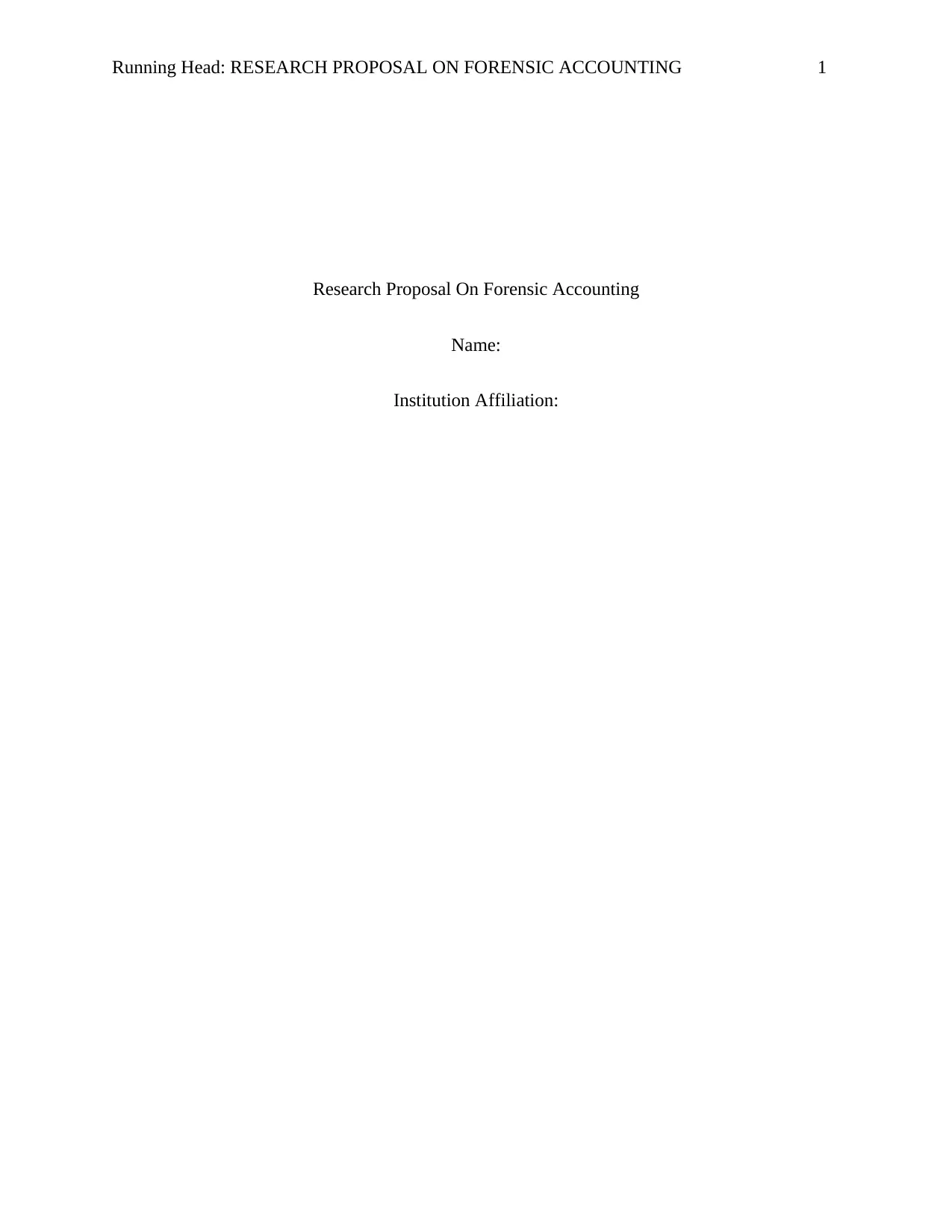
Running Head: RESEARCH PROPOSAL ON FORENSIC ACCOUNTING 1
Research Proposal On Forensic Accounting
Name:
Institution Affiliation:
Research Proposal On Forensic Accounting
Name:
Institution Affiliation:
Paraphrase This Document
Need a fresh take? Get an instant paraphrase of this document with our AI Paraphraser
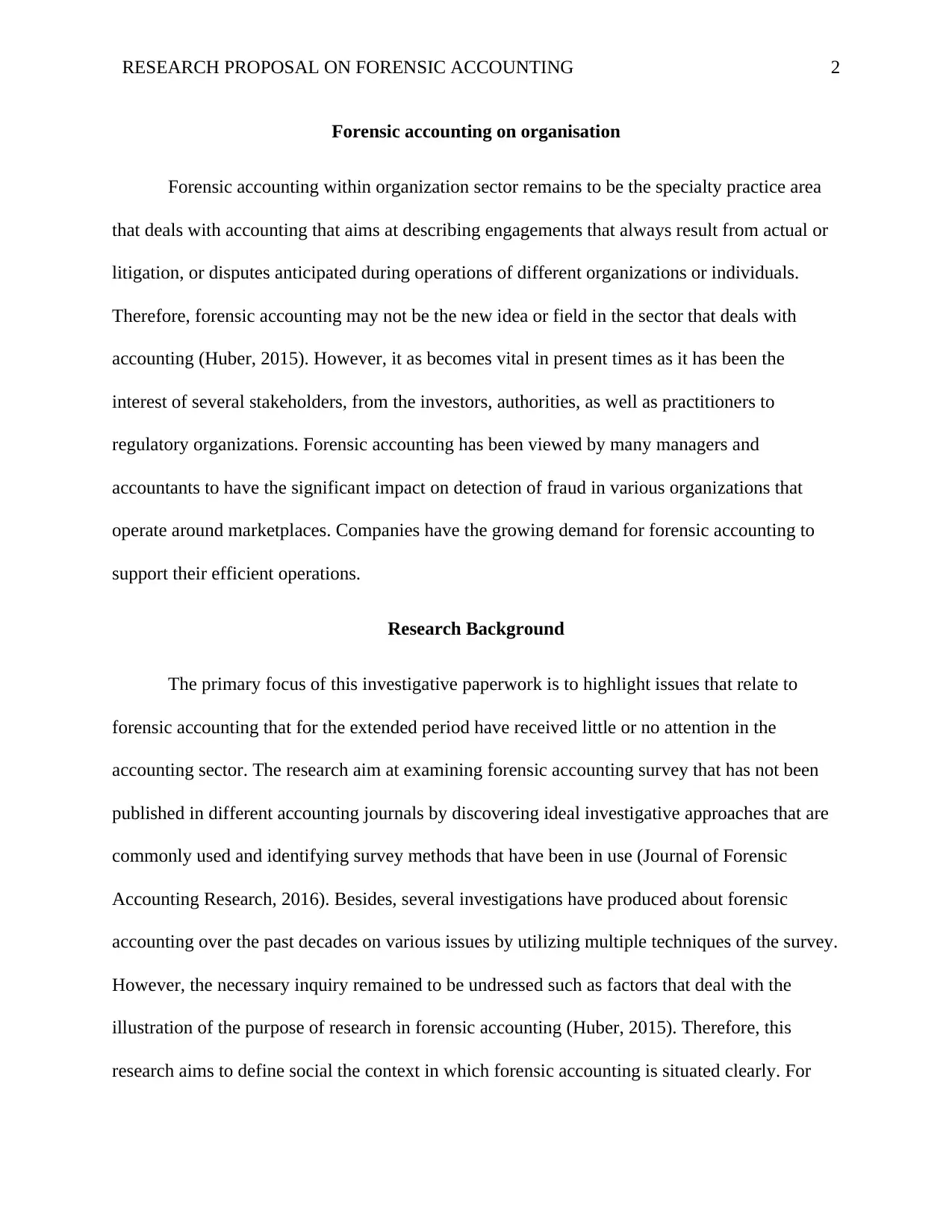
RESEARCH PROPOSAL ON FORENSIC ACCOUNTING 2
Forensic accounting on organisation
Forensic accounting within organization sector remains to be the specialty practice area
that deals with accounting that aims at describing engagements that always result from actual or
litigation, or disputes anticipated during operations of different organizations or individuals.
Therefore, forensic accounting may not be the new idea or field in the sector that deals with
accounting (Huber, 2015). However, it as becomes vital in present times as it has been the
interest of several stakeholders, from the investors, authorities, as well as practitioners to
regulatory organizations. Forensic accounting has been viewed by many managers and
accountants to have the significant impact on detection of fraud in various organizations that
operate around marketplaces. Companies have the growing demand for forensic accounting to
support their efficient operations.
Research Background
The primary focus of this investigative paperwork is to highlight issues that relate to
forensic accounting that for the extended period have received little or no attention in the
accounting sector. The research aim at examining forensic accounting survey that has not been
published in different accounting journals by discovering ideal investigative approaches that are
commonly used and identifying survey methods that have been in use (Journal of Forensic
Accounting Research, 2016). Besides, several investigations have produced about forensic
accounting over the past decades on various issues by utilizing multiple techniques of the survey.
However, the necessary inquiry remained to be undressed such as factors that deal with the
illustration of the purpose of research in forensic accounting (Huber, 2015). Therefore, this
research aims to define social the context in which forensic accounting is situated clearly. For
Forensic accounting on organisation
Forensic accounting within organization sector remains to be the specialty practice area
that deals with accounting that aims at describing engagements that always result from actual or
litigation, or disputes anticipated during operations of different organizations or individuals.
Therefore, forensic accounting may not be the new idea or field in the sector that deals with
accounting (Huber, 2015). However, it as becomes vital in present times as it has been the
interest of several stakeholders, from the investors, authorities, as well as practitioners to
regulatory organizations. Forensic accounting has been viewed by many managers and
accountants to have the significant impact on detection of fraud in various organizations that
operate around marketplaces. Companies have the growing demand for forensic accounting to
support their efficient operations.
Research Background
The primary focus of this investigative paperwork is to highlight issues that relate to
forensic accounting that for the extended period have received little or no attention in the
accounting sector. The research aim at examining forensic accounting survey that has not been
published in different accounting journals by discovering ideal investigative approaches that are
commonly used and identifying survey methods that have been in use (Journal of Forensic
Accounting Research, 2016). Besides, several investigations have produced about forensic
accounting over the past decades on various issues by utilizing multiple techniques of the survey.
However, the necessary inquiry remained to be undressed such as factors that deal with the
illustration of the purpose of research in forensic accounting (Huber, 2015). Therefore, this
research aims to define social the context in which forensic accounting is situated clearly. For
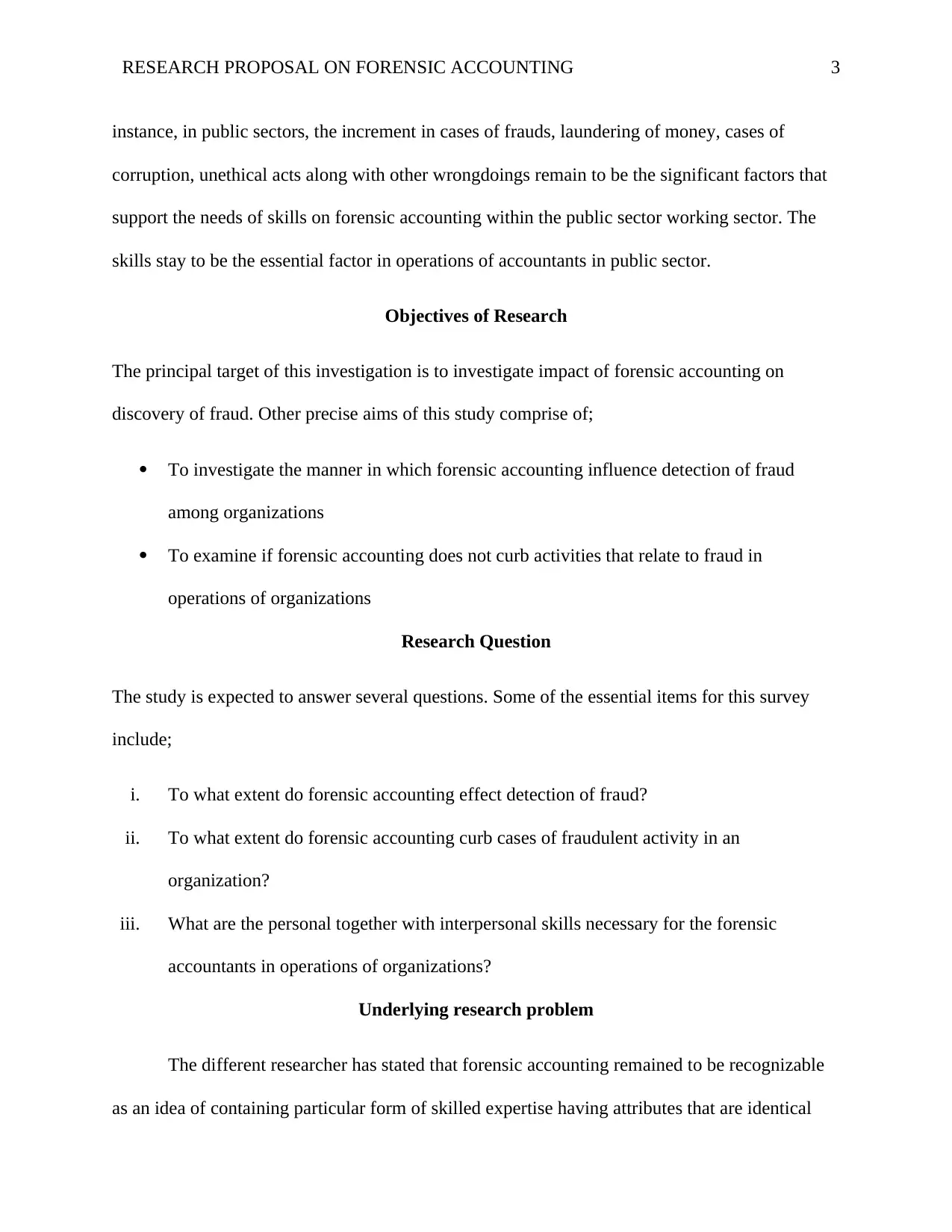
RESEARCH PROPOSAL ON FORENSIC ACCOUNTING 3
instance, in public sectors, the increment in cases of frauds, laundering of money, cases of
corruption, unethical acts along with other wrongdoings remain to be the significant factors that
support the needs of skills on forensic accounting within the public sector working sector. The
skills stay to be the essential factor in operations of accountants in public sector.
Objectives of Research
The principal target of this investigation is to investigate impact of forensic accounting on
discovery of fraud. Other precise aims of this study comprise of;
To investigate the manner in which forensic accounting influence detection of fraud
among organizations
To examine if forensic accounting does not curb activities that relate to fraud in
operations of organizations
Research Question
The study is expected to answer several questions. Some of the essential items for this survey
include;
i. To what extent do forensic accounting effect detection of fraud?
ii. To what extent do forensic accounting curb cases of fraudulent activity in an
organization?
iii. What are the personal together with interpersonal skills necessary for the forensic
accountants in operations of organizations?
Underlying research problem
The different researcher has stated that forensic accounting remained to be recognizable
as an idea of containing particular form of skilled expertise having attributes that are identical
instance, in public sectors, the increment in cases of frauds, laundering of money, cases of
corruption, unethical acts along with other wrongdoings remain to be the significant factors that
support the needs of skills on forensic accounting within the public sector working sector. The
skills stay to be the essential factor in operations of accountants in public sector.
Objectives of Research
The principal target of this investigation is to investigate impact of forensic accounting on
discovery of fraud. Other precise aims of this study comprise of;
To investigate the manner in which forensic accounting influence detection of fraud
among organizations
To examine if forensic accounting does not curb activities that relate to fraud in
operations of organizations
Research Question
The study is expected to answer several questions. Some of the essential items for this survey
include;
i. To what extent do forensic accounting effect detection of fraud?
ii. To what extent do forensic accounting curb cases of fraudulent activity in an
organization?
iii. What are the personal together with interpersonal skills necessary for the forensic
accountants in operations of organizations?
Underlying research problem
The different researcher has stated that forensic accounting remained to be recognizable
as an idea of containing particular form of skilled expertise having attributes that are identical
⊘ This is a preview!⊘
Do you want full access?
Subscribe today to unlock all pages.

Trusted by 1+ million students worldwide
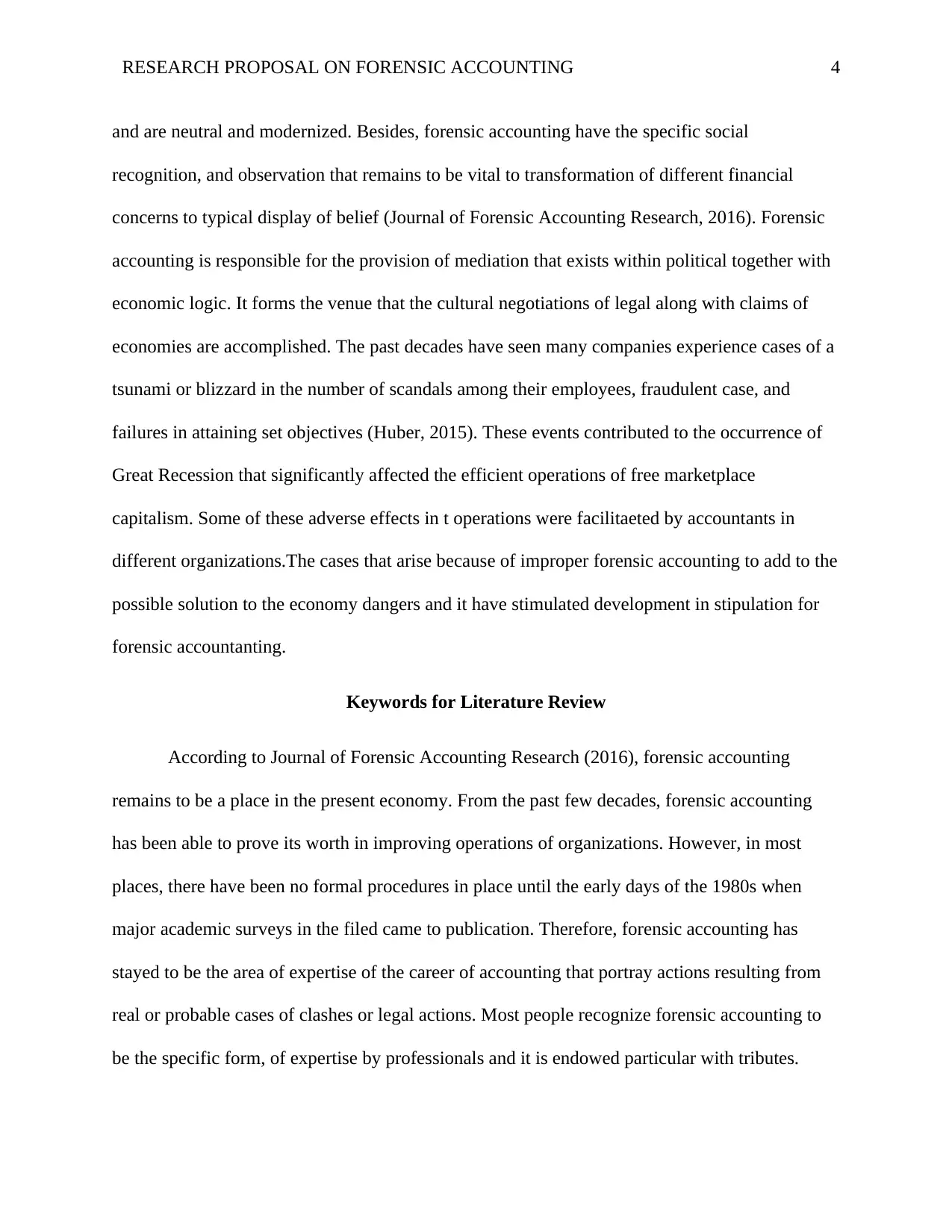
RESEARCH PROPOSAL ON FORENSIC ACCOUNTING 4
and are neutral and modernized. Besides, forensic accounting have the specific social
recognition, and observation that remains to be vital to transformation of different financial
concerns to typical display of belief (Journal of Forensic Accounting Research, 2016). Forensic
accounting is responsible for the provision of mediation that exists within political together with
economic logic. It forms the venue that the cultural negotiations of legal along with claims of
economies are accomplished. The past decades have seen many companies experience cases of a
tsunami or blizzard in the number of scandals among their employees, fraudulent case, and
failures in attaining set objectives (Huber, 2015). These events contributed to the occurrence of
Great Recession that significantly affected the efficient operations of free marketplace
capitalism. Some of these adverse effects in t operations were facilitaeted by accountants in
different organizations.The cases that arise because of improper forensic accounting to add to the
possible solution to the economy dangers and it have stimulated development in stipulation for
forensic accountanting.
Keywords for Literature Review
According to Journal of Forensic Accounting Research (2016), forensic accounting
remains to be a place in the present economy. From the past few decades, forensic accounting
has been able to prove its worth in improving operations of organizations. However, in most
places, there have been no formal procedures in place until the early days of the 1980s when
major academic surveys in the filed came to publication. Therefore, forensic accounting has
stayed to be the area of expertise of the career of accounting that portray actions resulting from
real or probable cases of clashes or legal actions. Most people recognize forensic accounting to
be the specific form, of expertise by professionals and it is endowed particular with tributes.
and are neutral and modernized. Besides, forensic accounting have the specific social
recognition, and observation that remains to be vital to transformation of different financial
concerns to typical display of belief (Journal of Forensic Accounting Research, 2016). Forensic
accounting is responsible for the provision of mediation that exists within political together with
economic logic. It forms the venue that the cultural negotiations of legal along with claims of
economies are accomplished. The past decades have seen many companies experience cases of a
tsunami or blizzard in the number of scandals among their employees, fraudulent case, and
failures in attaining set objectives (Huber, 2015). These events contributed to the occurrence of
Great Recession that significantly affected the efficient operations of free marketplace
capitalism. Some of these adverse effects in t operations were facilitaeted by accountants in
different organizations.The cases that arise because of improper forensic accounting to add to the
possible solution to the economy dangers and it have stimulated development in stipulation for
forensic accountanting.
Keywords for Literature Review
According to Journal of Forensic Accounting Research (2016), forensic accounting
remains to be a place in the present economy. From the past few decades, forensic accounting
has been able to prove its worth in improving operations of organizations. However, in most
places, there have been no formal procedures in place until the early days of the 1980s when
major academic surveys in the filed came to publication. Therefore, forensic accounting has
stayed to be the area of expertise of the career of accounting that portray actions resulting from
real or probable cases of clashes or legal actions. Most people recognize forensic accounting to
be the specific form, of expertise by professionals and it is endowed particular with tributes.
Paraphrase This Document
Need a fresh take? Get an instant paraphrase of this document with our AI Paraphraser
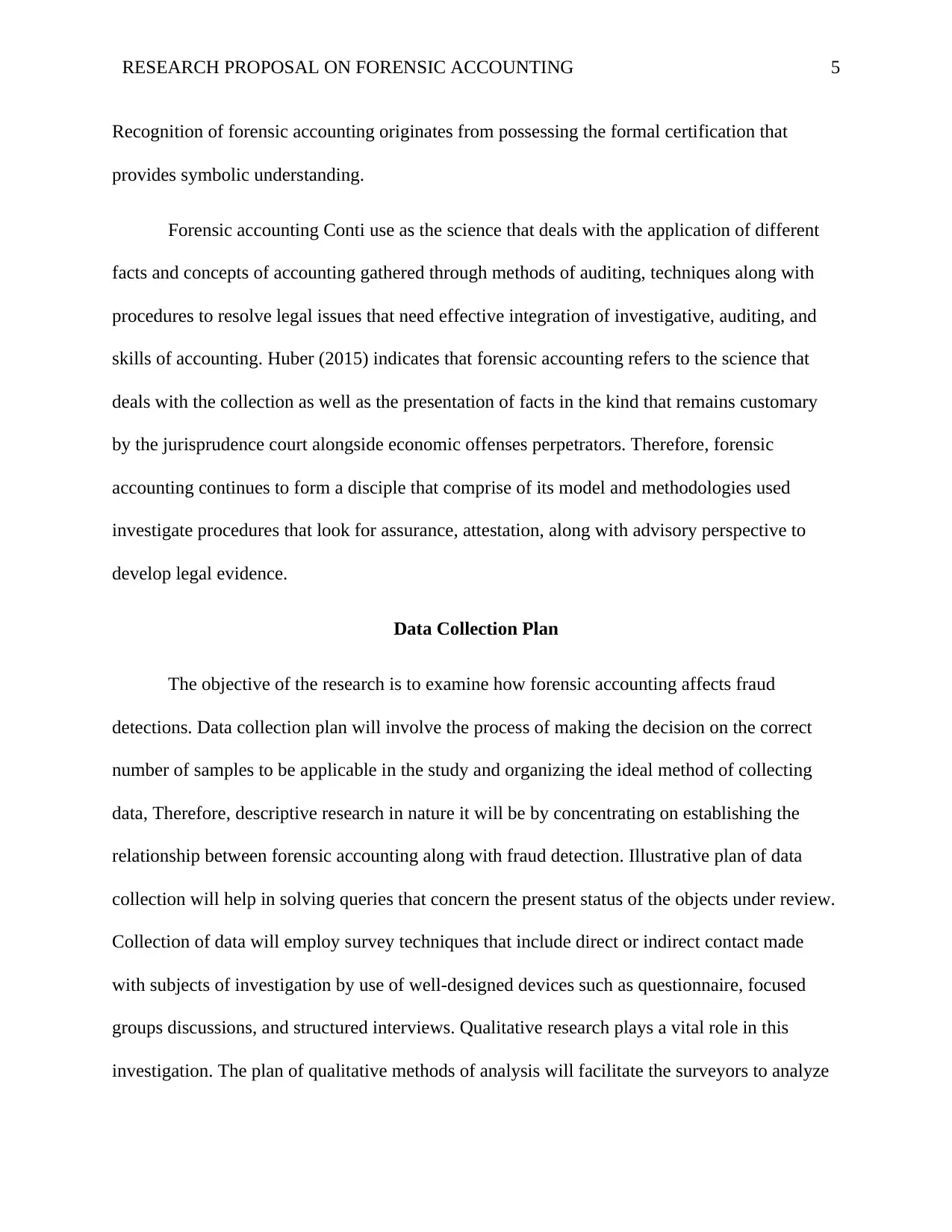
RESEARCH PROPOSAL ON FORENSIC ACCOUNTING 5
Recognition of forensic accounting originates from possessing the formal certification that
provides symbolic understanding.
Forensic accounting Conti use as the science that deals with the application of different
facts and concepts of accounting gathered through methods of auditing, techniques along with
procedures to resolve legal issues that need effective integration of investigative, auditing, and
skills of accounting. Huber (2015) indicates that forensic accounting refers to the science that
deals with the collection as well as the presentation of facts in the kind that remains customary
by the jurisprudence court alongside economic offenses perpetrators. Therefore, forensic
accounting continues to form a disciple that comprise of its model and methodologies used
investigate procedures that look for assurance, attestation, along with advisory perspective to
develop legal evidence.
Data Collection Plan
The objective of the research is to examine how forensic accounting affects fraud
detections. Data collection plan will involve the process of making the decision on the correct
number of samples to be applicable in the study and organizing the ideal method of collecting
data, Therefore, descriptive research in nature it will be by concentrating on establishing the
relationship between forensic accounting along with fraud detection. Illustrative plan of data
collection will help in solving queries that concern the present status of the objects under review.
Collection of data will employ survey techniques that include direct or indirect contact made
with subjects of investigation by use of well-designed devices such as questionnaire, focused
groups discussions, and structured interviews. Qualitative research plays a vital role in this
investigation. The plan of qualitative methods of analysis will facilitate the surveyors to analyze
Recognition of forensic accounting originates from possessing the formal certification that
provides symbolic understanding.
Forensic accounting Conti use as the science that deals with the application of different
facts and concepts of accounting gathered through methods of auditing, techniques along with
procedures to resolve legal issues that need effective integration of investigative, auditing, and
skills of accounting. Huber (2015) indicates that forensic accounting refers to the science that
deals with the collection as well as the presentation of facts in the kind that remains customary
by the jurisprudence court alongside economic offenses perpetrators. Therefore, forensic
accounting continues to form a disciple that comprise of its model and methodologies used
investigate procedures that look for assurance, attestation, along with advisory perspective to
develop legal evidence.
Data Collection Plan
The objective of the research is to examine how forensic accounting affects fraud
detections. Data collection plan will involve the process of making the decision on the correct
number of samples to be applicable in the study and organizing the ideal method of collecting
data, Therefore, descriptive research in nature it will be by concentrating on establishing the
relationship between forensic accounting along with fraud detection. Illustrative plan of data
collection will help in solving queries that concern the present status of the objects under review.
Collection of data will employ survey techniques that include direct or indirect contact made
with subjects of investigation by use of well-designed devices such as questionnaire, focused
groups discussions, and structured interviews. Qualitative research plays a vital role in this
investigation. The plan of qualitative methods of analysis will facilitate the surveyors to analyze
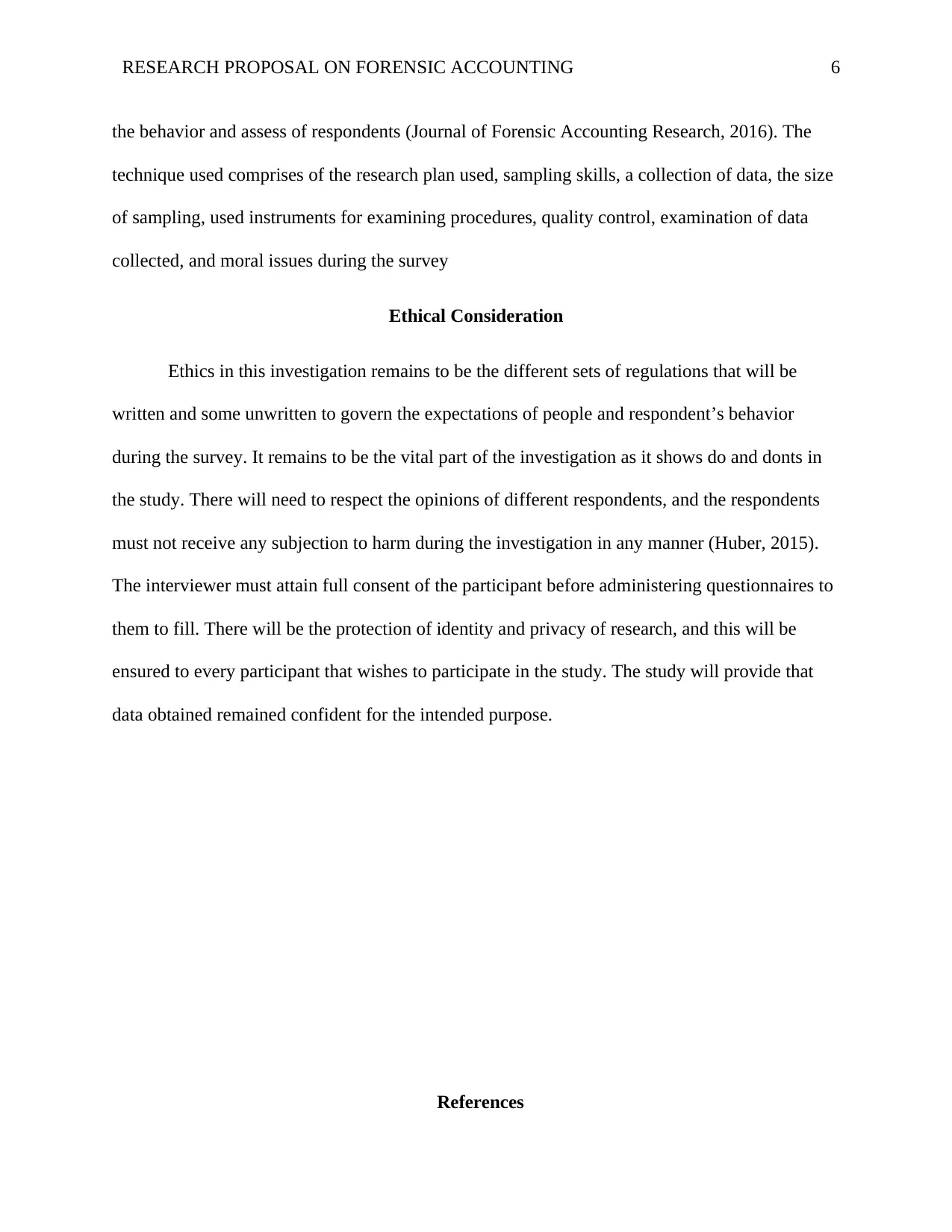
RESEARCH PROPOSAL ON FORENSIC ACCOUNTING 6
the behavior and assess of respondents (Journal of Forensic Accounting Research, 2016). The
technique used comprises of the research plan used, sampling skills, a collection of data, the size
of sampling, used instruments for examining procedures, quality control, examination of data
collected, and moral issues during the survey
Ethical Consideration
Ethics in this investigation remains to be the different sets of regulations that will be
written and some unwritten to govern the expectations of people and respondent’s behavior
during the survey. It remains to be the vital part of the investigation as it shows do and donts in
the study. There will need to respect the opinions of different respondents, and the respondents
must not receive any subjection to harm during the investigation in any manner (Huber, 2015).
The interviewer must attain full consent of the participant before administering questionnaires to
them to fill. There will be the protection of identity and privacy of research, and this will be
ensured to every participant that wishes to participate in the study. The study will provide that
data obtained remained confident for the intended purpose.
References
the behavior and assess of respondents (Journal of Forensic Accounting Research, 2016). The
technique used comprises of the research plan used, sampling skills, a collection of data, the size
of sampling, used instruments for examining procedures, quality control, examination of data
collected, and moral issues during the survey
Ethical Consideration
Ethics in this investigation remains to be the different sets of regulations that will be
written and some unwritten to govern the expectations of people and respondent’s behavior
during the survey. It remains to be the vital part of the investigation as it shows do and donts in
the study. There will need to respect the opinions of different respondents, and the respondents
must not receive any subjection to harm during the investigation in any manner (Huber, 2015).
The interviewer must attain full consent of the participant before administering questionnaires to
them to fill. There will be the protection of identity and privacy of research, and this will be
ensured to every participant that wishes to participate in the study. The study will provide that
data obtained remained confident for the intended purpose.
References
⊘ This is a preview!⊘
Do you want full access?
Subscribe today to unlock all pages.

Trusted by 1+ million students worldwide
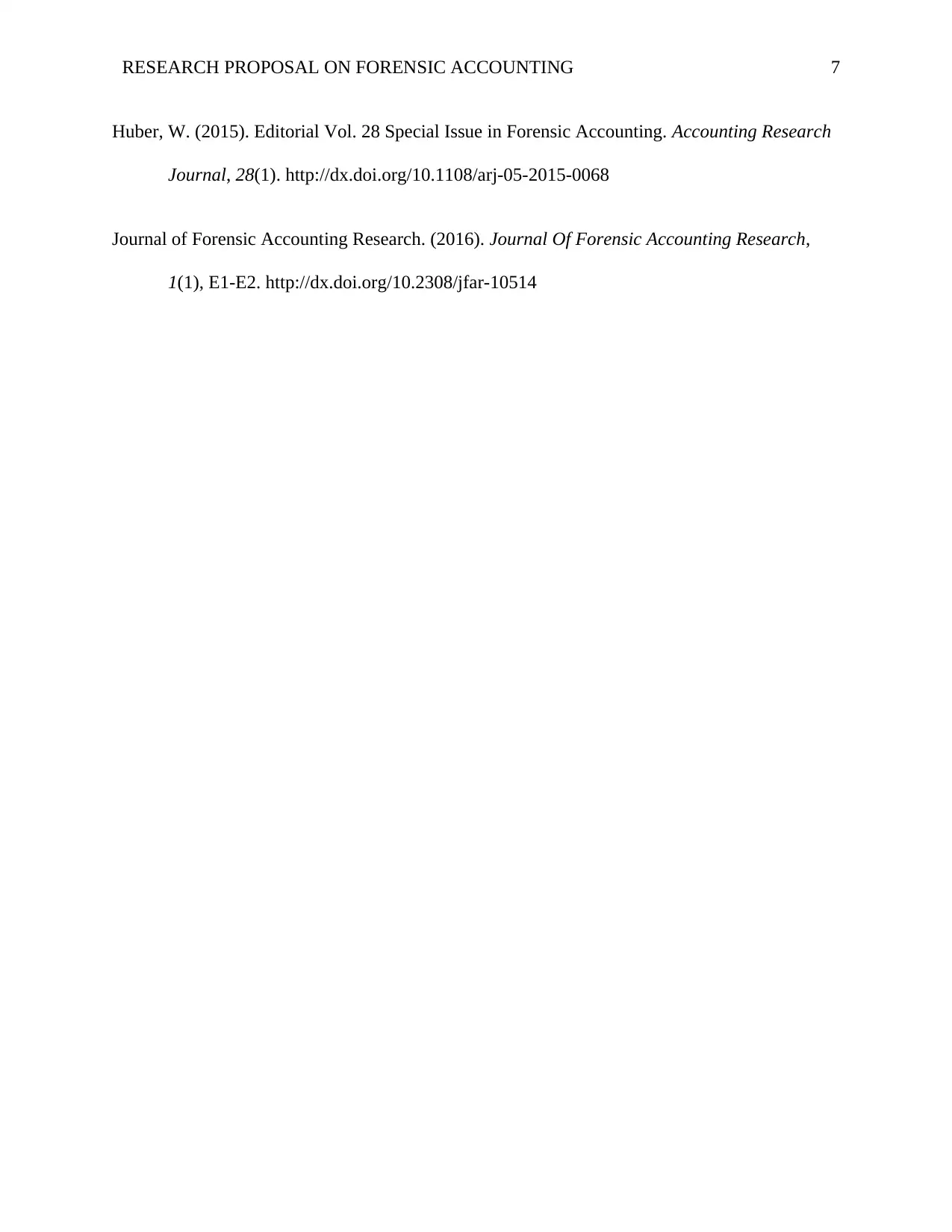
RESEARCH PROPOSAL ON FORENSIC ACCOUNTING 7
Huber, W. (2015). Editorial Vol. 28 Special Issue in Forensic Accounting. Accounting Research
Journal, 28(1). http://dx.doi.org/10.1108/arj-05-2015-0068
Journal of Forensic Accounting Research. (2016). Journal Of Forensic Accounting Research,
1(1), E1-E2. http://dx.doi.org/10.2308/jfar-10514
Huber, W. (2015). Editorial Vol. 28 Special Issue in Forensic Accounting. Accounting Research
Journal, 28(1). http://dx.doi.org/10.1108/arj-05-2015-0068
Journal of Forensic Accounting Research. (2016). Journal Of Forensic Accounting Research,
1(1), E1-E2. http://dx.doi.org/10.2308/jfar-10514
1 out of 7
Related Documents
Your All-in-One AI-Powered Toolkit for Academic Success.
+13062052269
info@desklib.com
Available 24*7 on WhatsApp / Email
![[object Object]](/_next/static/media/star-bottom.7253800d.svg)
Unlock your academic potential
Copyright © 2020–2026 A2Z Services. All Rights Reserved. Developed and managed by ZUCOL.




